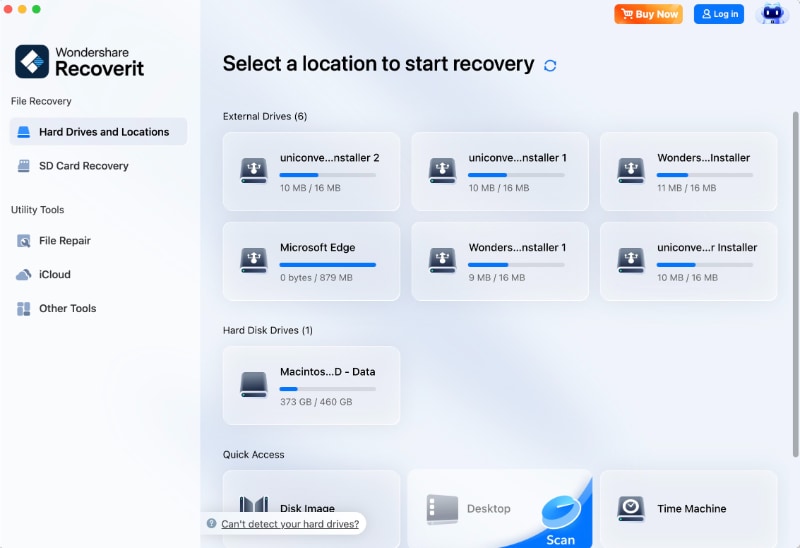How to Recover Lost Files From Mac Guest Account
Feb 05, 2026 • Filed to: Solve Mac Problems • Proven solutions
How do I recover files on Mac?
If you have ever used the guest account on a Mac, then you will probably know what comes along with it. If not, then here is a piece of information worth knowing - when the guest account user logs out from the Mac, all files and data created in that particular session will be removed.
While that may be a handy feature in case you have multiple users on your Mac and do not want them to interfere with your primary user's data - many users do not know about it. However, what if you want to recover lost files from the guest account on mac? Here, we will tell you how to recover deleted files on Mac with easy steps.
Overview: About the Mac Guest User Account
If you want to allow any other users, apart from yourself, to log into and use your Mac, then setting up a separate user account(s) is what you can do to protect your data stored on it. As the name suggests, setting up a guest user allows someone to use your Mac temporarily, without any of the privileges that permanent users have.
The three distinctive features of a Mac guest user are:
- Guest account users do not need any password for logging in.
- Those using the Mac guest account cannot change any of the computer or user settings.
- They cannot remote login, even when the same is enabled from Sharing options.
You can even set preferences to ensure that guest users only access the files that you want them to. Any folders and contents that guest users create are present in a temporary memory area, all of which are deleted as the guest logs out. It is something that you must enable on your Mac. If anyone ever does steal your Mac and accesses it via the guest account, then you can use Find My Mac to look for it.
The most common reasons for data loss in a Mac guest account:
- [Most] You logs out and delete the Mac user account while you do not save the files there to other places;
- Formatting the volume of the hard drive that stores guest account information, either by mistake or unintentionally;
- Any interruption when files are being moved between the guest account and any other storage device;
- Crashing of the operating system or hard drive when the Mac is in use;
- Accidental shutdown or a restart is triggered by some software;
These are just a few of the reasons that could cause you to lose files stored or modified in the Mac guest account. When this happens, what you need is data recovery software to help you recover lost files from Mac hard drive.
Option 1: How to Recover Files on Mac from Guest Account
1 Free Download the Mac File Recovery Software
If you or someone else has lost some important data that was previously stored in a Mac guest account, then do not worry. There are ways to recovery lots of files from the Mac guest account with ease. All you need is a Mac data recovery software, and it will take you just a few minutes to recover lost files from Mac guest account. This is where Recoverit Mac data recovery comes in as one of the best ways to recover lost files from Mac guest account.
2 Video Instruction: How to Recover Deleted Files on Mac
3 3 Steps to Undelete Files from Guest Account on Mac
Losing the data stored on the Mac Guest User account can be very painful, but luckily, you can get them back with consummate ease. Download Recoverit Data Recovery for Mac and follow the guide to start Mac undelete process.
1. Select the Mac Guest hard drive
To recover lost or deleted files from Mac guest account, you can select the hard drive that stored your Mac Guest User Account data. Click "Start" to get started.

2. Scan the Guest Account hard drive
The Mac undelete software will immediately start a thorough scan on your selected hard drive where your Mac Guest Account data were stored.

3. Preview and recover lost files
After the scanning, you can preview the recoverable files to confirm if they're what you want. Click the "Recover" button to get them back and save them into another safe storage device.

Option 2: Restore Files from Mac from Backups
If you did regular backups before the data loss, you can of course restore the deleted files previously saved on the Mac Guest Account from the backups. But since many people have no habit of backing up files, we still recommend Recoverit Mac Undelete software to you. For those who have backups, follow the below steps to recover deleted files on Mac now.
- Go to the location you store files backup, like iCloud or an external device.
- Select the files and folders you want to restore.
- Copy and paste them to another safe location you need.
If you back up data from the Mac Guest User account to the Time Machine, you can take the next steps directly to recover deleted files from the User account.
- Go to the Menu bar and choose "Time Machine".
- Open the folder that contains the deleted Mac Guest User Account files.
- Select and view the files, and click on the "Restore" button to restore from backup.
The methods are really simple and easy. So it is recommended that you keep a habit of data backup.
Bonus Tips. How to Prevent Lost Files on Mac
While recovering your lost files from a Mac guest account may be easy with the right Mac data recovery software, Recoverit Mac data recovery may be an easy task- it is still better to avoid such situations later on. Here are some things that you must keep in mind to prevent your Mac guest account data from being lost or deleted again:
- Before you restart or close your Mac, ensure that any information on it is saved or transferred to an external drive if you are using a Guest account.
- Do not pull the plug or interrupt the power supply to restart or switch off the computer.
- If you use any recovery software, then do not recover lost files to the same drive or destination they were deleted from.
- Do not uninstall any un-trusted or unauthorized software.
- Always switch off your computer following the proper procedure.
Thus, with these simple yet useful things taken care of, you will be able to not only make the best of Mac data recovery software but also prevent any such situations from re-occurring in the future.
What's Wrong with Mac
- Recover Your Mac
- 5 best data recovery software for Mac
- Recover my trashed files.
- Recover deleted files on Mac.
- 3 ways to restore Mac photos.
- Recover SD card files on Mac.
- Recover files from external hard drive on Mac
- Fix Your Mac
- Fix grey screen at startup.
- Ethernet issues occur | Fixed.
- Mac won't shut down. Boot it.
- Solve flashing question mark.
- Fix slow WiFi after upgrade.
- Delete Your Mac
- Format your USB drive.
- Delete APFS partition.
- How to format APFS drive.
- What can be cleaned on Mac.
- Format external hard drive.
- Learn Mac Hacks



 ChatGPT
ChatGPT
 Perplexity
Perplexity
 Google AI Mode
Google AI Mode
 Grok
Grok























Sue Wayne
staff Editor